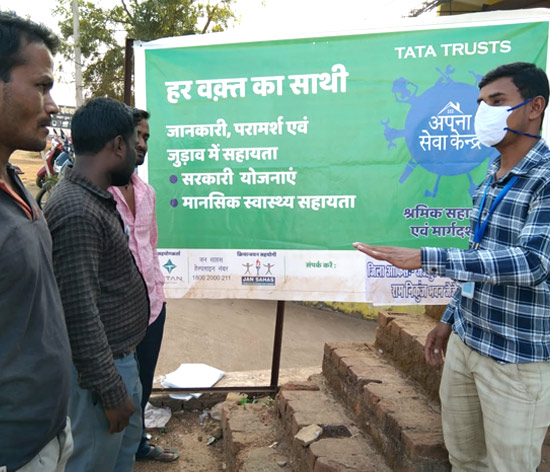
For the past ten years, Rajendra Karsh, a landless labourer from Janjgir-Champa district of Chhattisgarh, has been migrating with his family, working at one brick kiln after another to earn enough money to sustain his family. As a daily wage labourer his financial status was mostly unstable. Working in the brick kilns was his only source of income, and that was purely dependent on him finding work and its duration. When the pandemic broke out, Rajendra was one of the many migrant workers whose livelihood was affected.
When the lockdown was implemented to mitigate the effects of COVID-19 pandemic, Rajendra couldn’t find a new job. He decided to return to his village, but the journey back wasn’t an easy one. His family and he had to walk a great distance before they could board one of the early special trains for migrants, the Shramik Express, started by the Central Government.
Rajendra and his family had left their village because it didn’t offer opportunities for full-time employment. Now, back in their village, the continued lack of job left the family at the edge of a financial abyss. They had some savings but that could only tide over a few days. Rajendra even tried finding a job as an agricultural labourer in his village but those jobs were increasingly scarce due to the increasing use of machinery in agriculture. Neither could he leave the village because of the lockdown.
By now, Rajendra had been jobless for eight months. Seeing no means to sustain his family, Rajendra finally sought support and advice from the sarpanch of his village. The sarpanch informed him finding a job for him would not be an easy task since Rajendra did not have a MGNREGA card. Rajendra and his family were not present in the village when MGNREGA cards had been made for other villagers.
Rajendra was aware of the MGNERGA card, but due to his demanding work hours, he had not been able to apply for one. Nor had he imagined that he would ever need one. Now, faced with the spectre of continued unemployment, Rajendra didn’t know where to turn.
It was then that he had a stroke of luck. He met Shiv Kumar Chandra, a ‘Jan Saathi’ , who had helped over 12 families in Bodsara panchayat find jobs and earn a living. Shiv Kumar explained that he worked for an organisation called Jan Sahas that worked extensively in over 14,000 villages and urban areas of 57 districts across nine Indian states. The organisation worked with the most excluded social groups, aiding safe migration and ensuring the protection of workers’ rights. The 20-year-old organisation also focused on the prevention of sexual violence against women and children.
Presently, explained Shiv Kumar, they were working with the Tata Trusts to implement a unique migrant-support programme called Mission Gaurav. The Jan Saathis were mapping migrant workers and helping them avail eligible social security schemes. Shiv Kumar then walked Rajendra through the process and helped him file an application for a MGNREGA card.
Rajendra was elated when the cards arrived within a week. “With the help of the card, both my wife and I have found jobs under the MGNREGA scheme through the panchayat,” he says, expressing his gratitude to both the Mission Gaurav project and to Shiv Kumar for standing by him at this critical juncture. He is especially grateful that Jan Sahas did not charge him any fees for the project.
However, Rajendra’s struggles haven’t ended here. His daily wages are much lower than the Rs400 he used to earn at the brick kilns. He would like to migrate in search of better paying jobs but is unable to leave the village given the current situation. However, once the brick kilns start functioning at full capacity, Rajendra hopes to leave his village to secure a better future for his family.
